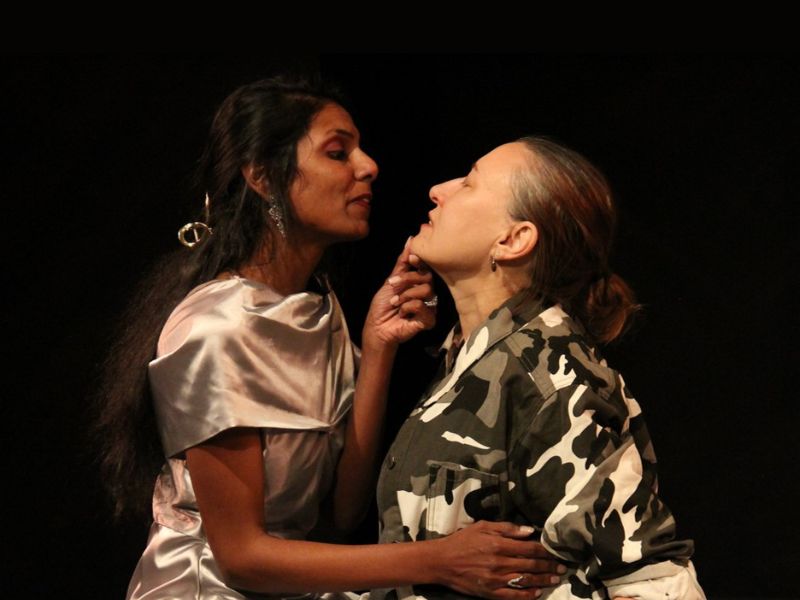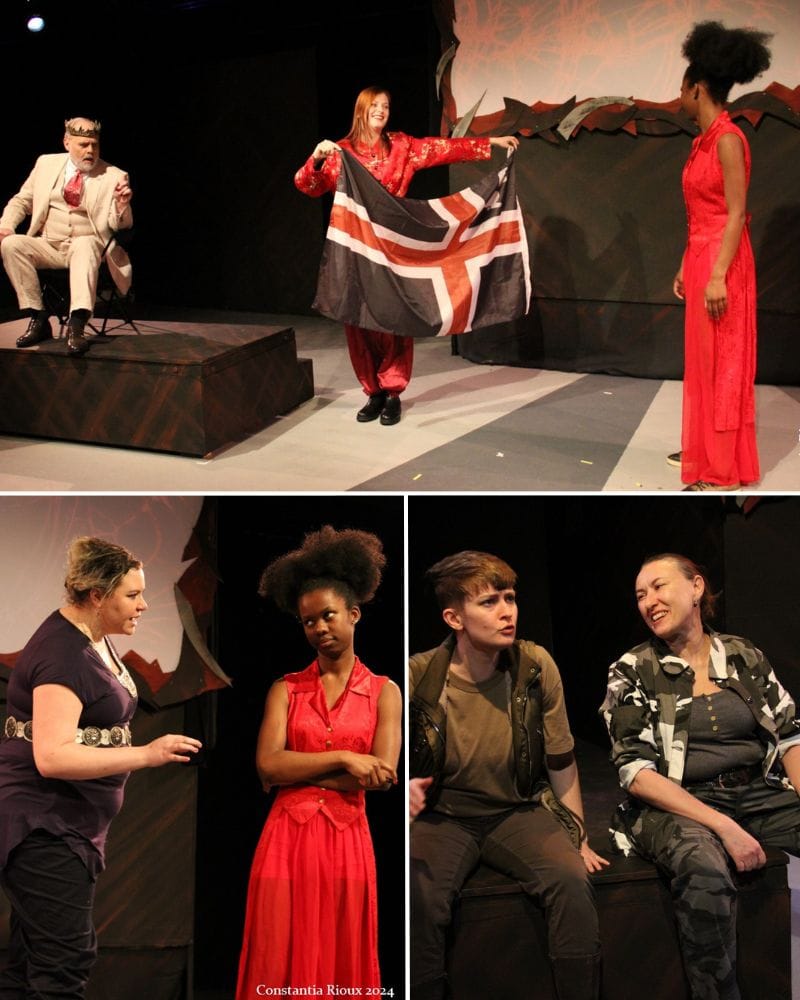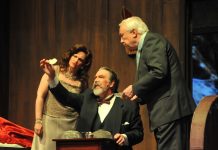By Morgan Pavey
The Rude Mechanicals, the whimsically named company in residency at Greenbelt Arts Center, is back with an abridged production of Macbeth.
I love the name Rude Mechanicals. Lifted from Shakespeare’s lovable band of amateur actors in A Midsummer Night’s Dream, it exemplifies the goal of community theater: to rehearse and perform a story for no compensation other than the joy and satisfaction of doing a play as much justice as you can.

In director Liana Olear’s production of Macbeth, I witnessed a close community committed to telling this story in a way that, while occasionally lacking in technical expertise, nonetheless proved interesting and uniquely theirs. They achieved this ownership mainly by Olear’s abridgment of the play and through clever incorporation of technology.
At just 75 minutes long, the plot moves so quickly that it can be difficult to follow. I’m not certain you’d get what was going on if not already familiar with the play, but this pared-down rendition creates a compelling hyper-focus on the relationship between Macbeth and Lady Macbeth.
For those not familiar with the story of Macbeth, the play centers around Macbeth, a high-ranking soldier in the Scottish army and defender of King Duncan. Macbeth is tempted by three malcontent witches to become King of Scotland. He is spurred on in this ambition by his wife, Lady Macbeth, and together they ruthlessly pursue a path of regicide and murder to maintain the stolen crown. This journey drives them both mad, a process aided by the ongoing interference of the witches, and we witness what happens to a relationship under savage strain.
The brisk pace of this telling demanded that the character arcs develop just as rapidly, a feat that some cast members pulled off better than others. The demand was notable on the actors playing the Macbeths, whose relationship occupied the greatest overall span of stage time as we clipped along.
Lady Macbeth, played with dedication and impressive range by actress Aparna Sri, was most successful in her transformation; each scene brought a progression of her deteriorating mental state and a clear development of her changing perspective.
Macbeth, played by the no-less-dedicated Jaki Demarest, began clearly but stalled slightly in the second act. Soliloquies in the later moments of the play, though delivered with precision of text and with passion, fell into the trap of playing a tone over an action or objective, and began to feel the same from one scene to the next.
The production’s biggest misstep was in the handling of Malcolm, the son of the murdered King Duncan, which may have been partly due to this difficulty of pace. It’s a particularly tricky track, requiring the actor (an amusing Jaelyn Evans) to take on lots of new information constantly and change on a dime. Through a combination of performance and pace, Malcolm casually handled extremely personal and serious situations without taking the time to inhabit the depth of their import. This created reactions that felt comedic in their delivery, as when Malcolm’s response to finding out his father had been murdered elicited a laugh from the audience (which I can’t imagine was the intended result) and put the character in a different genre of story from the rest of the cast.

The most inventive device of Olear’s production by far was her inclusion of real-time and recorded video. The three witches performed via Zoom and were dynamically projected on a screen that remained onstage throughout the night. Motivated by a desire to provide performance opportunities for immunocompromised actors, the result was effective due to its strong textual support. The witches are described in Macbeth as belonging to a different realm, both part of this world and apart from it, and their spooky power lies in how they inspire real political action from the suggestion of unreal images or stories. In our current time of AI deepfakes and unreliable online news sources, it’s easy to believe in screen spirits like these.
The onstage screen was further put to use with clever pre-recordings to supplement live action, as well as real-time video footage that occurred offstage in nearby parts of the Arts Center. I particularly appreciated how this live footage was used in moments of violence or death. Onstage violence is most effective when the audience is complicit in its imagining (we know it’s not real, so the more you get us to create it with you, the more we believe it), and having moments develop just out of sight or reach elevated their impact.
Overall, The Rude Mechanicals succeeded in providing me with a deeper appreciation for Macbeth’s relevance to our current social-political situations and has made me want to return to the text of the play in its entirety to explore it further. Performances run only through next weekend, so get your tickets soon.
Running Time: Approximately one hour and 25 minutes, including a 10-minute intermission.
Macbeth plays through February 10, 2024, presented by The Rude Mechanicals performing at Greenbelt Arts Center, 123 Centerway, Greenbelt, MD. To purchase tickets ($24, general admission; $22, senior/military; $12, child/student), call (301) 317-7964 or go online.
COVID Safety: Masks are optional.

Macbeth
Written by William Shakespeare
Directed by Liana Olear
Assistant Direction by Wes Dennis and Alan Duda
Technical Direction, Video, and Lighting Design by Jeff Poretsky
Sound Design by Eric Honour
Intimacy and Fight Direction by Stephanie Davis
CAST
Helen Chang Mao
Linda “Spencer” Dye
Lisa Watson
Bill Bodie
Kate Medwar-Vanderlinden
Jaelyn Evans
Jared Hite
Jaki Demarest
Sarah Pfanz
Aparna Sri
Sean Eustis
Stephanie Davis
Alan Duda




